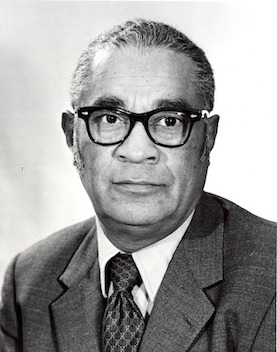Wade Ellis facts for kids
Quick facts for kids
Wade Ellis
|
|
|---|---|
 |
|
| Born | June 9, 1909 |
| Died | November 20, 1989 (aged 80) |
| Nationality | American |
| Other names | Wade Ellis, Sr. |
| Education |
|
| Occupation | Mathematician |
| Years active | 1944 – 1989 |
| Known for |
|
|
Notable work
|
|
| Spouse(s) | Agatha Ellis |
| Children |
|
Wade Ellis (June 9, 1909 – November 20, 1989) was an American mathematician and educator. He taught at Fort Valley State University in Georgia and Fisk University in Nashville, Tennessee. He earned his Ph.D. in mathematics from the University of Michigan in 1944. He also did important research on radar antennas at the MIT Lincoln Laboratory. Later, he taught at Boston University and Oberlin College, becoming a Full Professor in 1953. In the same year, he joined the Board of Governors of the Mathematical Association of America.
Ellis was a strong supporter of math education. In 1966, the government of Peru honored him for his work. He returned to the University of Michigan in 1967 as an Associate Dean and Professor of Mathematics. He retired in 1977 and was named Professor Emeritus. After retiring, he held several leadership roles, including vice chancellor at University of Maryland Eastern Shore and interim president of Marygrove College.
Early Life and Education
Wade Ellis was born in Chandler, Oklahoma on June 9, 1909. He was one of ten children in his family. As a child, he helped out at his family's restaurant. He also played the trombone in a family band.
Ellis was a very bright student. He graduated from Douglass School at age 14. He then went on to college, earning his bachelor's degree from Wilberforce University in Ohio in 1929. He was only 18 years old at the time. He later earned his master's degree from the University of New Mexico in 1938. In 1939, he moved to Ann Arbor, Michigan to study for his Ph.D. He completed his Ph.D. from the University of Michigan in 1944.
He passed away from a heart attack on November 20, 1989, in San Jose, California.
A Career in Mathematics
Wade Ellis faced challenges during his early career because of his race. For example, when he received his master's degree from the University of New Mexico in 1938, he had to march at the very end of the graduation line. Also, when he was invited to speak at a meeting of the American Mathematical Society, there were rules that prevented Black people from dining with the group. However, some mathematicians helped arrange the seating so that Ellis could still have dinner with them, which was a big step forward.
In 1938, he gave a presentation to the Southwestern Section of the Mathematical Association of America (MAA). He started his teaching career in a one-room schoolhouse in Oklahoma. He also taught at the Boys Industrial School in Boley, Oklahoma, Fort Valley State College in Georgia, and Fisk University in Nashville, Tennessee. These schools were all segregated at the time.
In 1939, Ellis moved to Ann Arbor, Michigan with his wife Agatha and their newborn son. He began his doctorate studies at the University of Michigan. At that time, only a few universities accepted Black students. The University of Michigan was known for treating Black students relatively well, even though it still had some segregation policies. Ellis encouraged his brother, Francis, to also attend the university. Under the guidance of George Yuri Rainich, Wade Ellis completed his Ph.D. in mathematics in 1944. He was the twelfth African-American to earn a Ph.D. in mathematics in the United States. His thesis was considered the "best in his department."
From 1944 to 1948, he worked at the MIT Lincoln Laboratory. There, he conducted important and secret research on radar antennas. He also helped detect if the Soviet Union had set off atomic weapons. After this, he taught at Boston University. He then became the first Black faculty member at Oberlin College, where he taught for 19 years. While at Oberlin, he also served on the city council and was the town's Vice-Mayor for one term. In 1953, he became a Full Professor. He was also elected to the Board of Governors of the Mathematical Association of America.
In 1967, he became the Associate Dean of the Horace H. Rackham School of Graduate Studies and a Professor of Mathematics at the University of Michigan. He helped with the Michigan Scholars Program, which supported students. He also advised international groups on how to improve math education in developing countries. In 1966, the government of Peru honored him for his help with their higher education system. He retired from the University of Michigan on August 31, 1977.
After retiring, he continued to work in leadership roles. He became the vice chancellor of academic affairs at University of Maryland Eastern Shore. He also served as interim president of Marygrove College in Detroit. In 1980, he wrote the foreword for the book Black Mathematicians and Their Works. This book was part of an effort to make math education fair for all students. Ellis believed it was important to show that promising young Black students could become great mathematicians.
Awards and Honors
- Rosenwald Fellowship
- Comendador en la Orden de las Palmas Magisteriales del Peru (1966) - This is an award from Peru for his contributions to education.
 | Selma Burke |
 | Pauline Powell Burns |
 | Frederick J. Brown |
 | Robert Blackburn |

